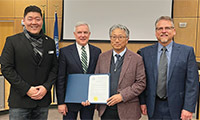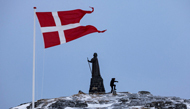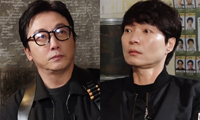Metamorphosis: Physician Heal Thyself
▶ Los Angeles Survival (31)
Within the year the doctor’s name appeared in the lead paragraph of the newspapers. He was charged with selling drugs. Not prescribed but selling drugs; there was a difference, it seemed. Still, there was sympathy for the doctor. He must be in shock from his wife’s suicide and depressed and did not realize what he was doing. There was no follow-up story. Apparently the charges were dropped. And the doctor was back in his office, practicing. Older Koreans (whether to show support) became his patients, and since they were elderly remained with him until they died. During this time, the doctor remarried. The wife was American. Since the doctor and his new wife did not mingle socially, Koreans knew little about her. Then the birth of a son was announced. That settled any question about the wife. She had done her duty, the boy was her witness that she was a good woman. However when the son was about three years old, the doctor and wife divorced. Divorces were common and not newsworthy unless the parties were movie stars or very famous.
Then there was the account in the newspapers about a woman and her brother arrested "rolling drunks" in Main Street bars. It was wartime and soldiers arriving in Los Angeles’s Union Station found Main Street beckoning, the attraction the bright lights of wine, women and song. The soldiers were America’s heroes on their way to do battle overseas and were dear to every citizen’s heart and must be treated with respect. Yes! To spike their drinks and roll them for their wallets was indeed outrageously unpatriotic. Yes again! The brother-and-sister act that had been going on before the war was looked upon with great disfavor. After many misdemeanor charges and jail sentences, the pair received prison terms and Main Street was safe for the soldiers. The doctor’s divorced wife and mother of his son was the sister in the brother-and-sister act.
The mother, removed from her motherhood role, lost custody of the son, who was given to the father by court order. The doctor was not particularly paternally-inclined. He was self-centered and his first interest were sick people. The boy was healthy and normal, interested and curious about everything, including people. His father was people, and he took his father’s hand without questioning the events that brought him into the father’s life once more. His mother had gone away for awhile was the reason he was given. She’d often been away in the past and the answer sufficed.
A housekeeper maintained the doctor’s house. She ran it like a hotel without room service, but the doctor did not notice. She kept the place sanitized and that he appreciated. Few visitors came to the house, but among them were his brother’s associates in KNA (Korean National Association). The boy’s appearance changed the atmosphere of the hotel-like house and the housekeeper went along with the changes. She did not complain nor did she quit. The rooms looked like galleries filled with still life pictures. Toys dropped as the child went through. Life trailing in once-static rooms. Now colorful and warm. The doctor remained unaware of his son and the changes until ...
The mother was released from prison and started a custody fight to regain the boy. California law generally supported mothers when custodial care of minor children was involved. More so when race (ethnicity) entered the picture. In this instance, an American mother versus an Oriental father. Surprisingly, the father won permanent custody, with the mother granted visitation rights. The mother turned the visitation rights into confrontations, threats and tears. Upsetting the boy’s equanimity. The doctor took matters into his own hands and did what he thought was best for the boy. He spirited the boy into a school in the country and gave the mother no forwarding address. The school in its brochure described itself an educational institution making boys into men. Meaning a military academy. It was located some distant, but not too far, from the city. The mother was from Okie country, familiarly referred to as the Dust Bowl, and detested the very word country. She would make no effort to traipse through dust and sage. Which she didn’t.
Instead she offered to end the litigations in return for compensation for the suffering caused her by the loss of the son. She named a sum in only four figures. The doctor who thought himself hardened to anyone else’s words or deed was chilled and felt fear. Not for himself but for the boy. Who stood a lonely bit of humanity and only a child, with parents at odds with each other. What was his fate, left in the hands of the mother? She loomed rapacious in the doctor’s mind, ready to devour her young. He was sickened by the greed, to which he also contributed. The woman went on, "Then we will be quits." The words clinched the matter. He saw his lawyer, made out a trust fund that was foolproof, the lawyer said, and the boy would be safe, secure in the event of the doctor’s death. His brother was named guardian, the same brother who had seen him through medical school and been the moral support in recent years when his life was in shambles. The doctor was not religious, not spiritual, rather an agnostic. But at this moment the words of William Cullen Bryant’s lines surfaced: "There is a Power whose care/Teaches thy way along that pathless coastÑ" The doctor surprised himself, placing his son in His hands.
A father-son relationship was in the making. Each one a life on its own, on separate levels, merging. Into what? The doctor surprised himself again: Immortality. They were going on forever, father and son. It was a moment of metamorphosis, a supernatural change. And like all supernatural change it quickly vanished from the mind.
The routine of their separate lives went along smoothly. The doctor to his office where patients waited for his arrival. The boy at the military academy where he was becoming a man. The doctor renewed his studies in medicine. Strides were made in science and new equipment devised. He traveled to seminars and lectures, and immersed himself in medical journals. He was kept occupied in the office and out of it, too. Weekends he and the boy were family. Missing was the mother person. The housekeeper who did well keeping them fed and housed did not fit that need. She’d had two divorces and looked upon the doctor and son as children, not a menage. These sentiments she did not voice. The doctor said their social life must be enlarged, speaking to his office assistant, who was of Mexican descent and an extrovert type. She suggested why not take the boy to Baja (lower California) and let him see a foreign country. He liked the idea.
Their first visit to Rosarita Beach was unlike any California beach town, and it was to become their playgroundÑswimming, fishing, lazing in the sun. The office assistant’s family lived near Rosarita and she spent her weekends with them. And then the doctor picked her up Sunday nights to return to Los Angeles, usually late to avoid the traffic.
This was their last weekend until the boy’s summer holidays. He faced a heavy schedule when he reached the school Monday. It included desert training, mountain climbing, cross country hikes to strengthen muscles for the fall semester when the boys were promoted from their present junior cadet level. The stay had been pleasant, Rosarita beaches were quiet as this was the weekend after Easter. The boy met more age-group friends, mixed with them, and communicated in several languages. Mexican, American, and a few Oriental words. It was great, the boy said, packing himself in the car between the driver and his father, and fell asleep. The doctor dozed off, knew his assistant was a competent driver. When they reached the border, he would take the wheels and finish the trip into Los Angeles. Everything in the doctor’s life was organized now and he felt better for it, then he fell asleep too.
Coming around a curve on the two-lane highway, only the driver saw ahead. There parked across the road was a tractor. Her cry, "Omigod!" was followed by the impact of the car and tractor’s colliding. She gripped the wheel, slammed on the brake. She could do nothing more. The slumbering passengers may or may not have felt or heard the impact. Their heads crashed into the windshield Ñseat belts had not been introduced Ñand were killed.
The driver escaped with bruises and broken ribs. Her life was spared.
I had been one of the doctor’s patients, getting vitamin shots for anemia. That Monday was my appointment. It was then I learned about the deaths. For the living, death is unspeakably cruel. And so it was for the doctor and son. Their lives had taken a fresh direction and their deaths were to all senseless. The story about the Buddha made some sense here. The Master pronounced the enlightenment of a disciple, who walked away and was gored by a rampaging bull. Why, he was asked, had this tragedy happened when the man had only been enlightened. His reply, "It was his time." The doctor and boy crossed over to Immortality. It was meant to be.
Sometime later, one of the doctor’s friends, a Korean woman, put closure to the story. The doctor’s brother, she told, went into probate court, and as the son was dead, requested to be named heir to the son’s trust fund. A goodly sum of 100 thousand dollars. The ex-wife arrived with her lawyer and claimed the estate as the boy’s natural mother. The court awarded her the trust fund. In California laws, when parent and child died simultaneously, the living or surviving parent inherited, not relatives even though there was a will. "Cream of the jest" was the fitting title ending the litigation.
And even more so was the doctor’s fee paid to the lawyer in the drug case. The lawyer, when asked his fee told the doctor, "You will pay me 200 dollars a month for the rest of your life. The fee is a 50-50 gamble. I may die in a year. You may die in a year. Take it or the fee I will charge will rattle the teeth out of your head." Or words that had the same meaning. The lawyer had empathy for the doctor. They were both of minority races and the lawyer was a man who had walked in another man’s shoes. The sum was agreed upon. The doctor served out his life (sentence) in useful healing. The lawyer was a criminal lawyer and became famous and very rich, protecting movie stars and Las Vegas gangsters. Who is to say which man served the more useful life.
스마터리빙
more [ 건강]
[ 건강]이제 혈관 건강도 챙기자!
[현대해운]우리 눈에 보이지 않기 때문에 혈관 건강을 챙기는 것은 결코 쉽지 않은데요. 여러분은 혈관 건강을 유지하기 위해 어떤 노력을 하시나요?
 [ 건강]
[ 건강]내 몸이 건강해지는 과일궁합
 [ 라이프]
[ 라이프]벌레야 물럿거라! 천연 해충제 만들기
 [ 건강]
[ 건강]혈압 낮추는데 좋은 식품
[현대해운]혈관 건강은 주로 노화가 진행되면서 지켜야 할 문제라고 인식되어 왔습니다. 최근 생활 패턴과 식생활의 변화로 혈관의 노화 진행이 빨라지고
사람·사람들
more
[한인단체 신년 인터뷰] LA 평통 장병우 회장… “본연 역할로 한반도 평화 실질 기여”
민주평화통일자문회의 LA협의회(이하 LA 평통) 장병우 회장은 6일 본보와의 신년 인터뷰에서 붉은 말의 해인 병오년 새해를 맞아 신년 화두로 …

워싱턴주에 첫 한인 시의장
워싱턴주에서 첫 한인 시의회 의장이 탄생했다. 제이슨 문(한국명 문태원) 머킬티오 시의원이 새해 들어 시의장으로 선출되며 또 하나의 중책을 맡…
국회 방문단 대한인국민회 방문
윤후덕·이해식·김한규 의원과 조오섭 국회의장 비서실장 등 10여 명의 한국 국회방문단이 지난 5일 LA를 찾아 로즈데일 묘지와 국민회관 등 미…
[한인단체 신년 인터뷰] 명원식 파바월드 회장… …
“한인 차세대들이 바르게 자랄 수 있는 토대를 만드는 것이 제가 파바월드의 회장으로 존재하는 유일한 이유입니다”한인사회의 대표적 청소년 봉사 …
LA한인회 멘토 프로그램 10일 스티브 강 위원장
LA 한인회(회장 로버트 안)가 한인사회 차세대 인재양성 노력의 하나로 ‘멘토를 만나다’ 프로그램을 정례화해 실시하고 있는 가운데 그 세 번째…
많이 본 기사
- 머스크, 韓인구절벽 또 경고… “북한군 그냥 걸어 넘어오면 돼”
- 구글 공동창업자도 오라클 회장도…탈캘리포니아?
- 덴마크·그린란드, 美 ‘그린란드 회담’ 수락에 “환영”
- 연예계 은퇴합니다..돌연 충격 선언한 조윤우·소희·이태임
- 트럼프, ‘美 베네수 운영 관여 1년 넘나’ 묻자 “훨씬 더 길 것”
- 젤렌스키 “美 우크라 안전보장안, 트럼프 결정만 남아”
- ICE 요원 총격… 시민권자 여성 사… 4
- [스키 기고] 초보자의 수난과 고수의 허세
- “공업용 실리콘을 얼굴에”..故 선풍기 아줌마, 충격적인 성형 부작용[꼬꼬무]
- 내란특검, 尹 구형 숙고 6시간 ‘마라톤 회의’…키는 조은석 손에
- 탁재훈·신정환, 드디어 컨츄리꼬꼬 재회.. “또 잡힌 겁니까?”[노빠꾸]
- 트럼프 관세에 美 무역적자 16년만에 최소…의약품 수입 금감
- 초강경 이민단속, 아시아계도 큰 타격 3
- ‘美 정복’ 손흥민, 케인·메시·음바페와 어깨 나란히... ‘올해의 팀’ 공격수 부문 후보 등극
- 美, 인천에 본부 둔 녹색기후기금 탈퇴… “자금지원 안해”
- ICE Agent Shooting Sparks Outrage: U.S. Citizen Woman Killed
- 케빈 김 주한 미 대사대리 전격 이임
- ‘오타니·야마모토’ 때문에 日 못 뚫는 SF, ‘이정후 파워’로 한국 개척 나선다... 일본도 주목 중
- 유엔기후협약, 美 탈퇴에 “자책골…재가입문 열려있어”
- 초강경 이민단속, 아시안 커뮤니티도 큰 타격
- 이주자 텍사스 몰린다 가주는 유입자 최하위
- 팰팍 타운 77만달러 적자 놓고 정치권‘충돌’
- ‘데이트 폭력 폭로’ 재키와이, 돌연 입 열었다 “흉기·스토킹 NO”
- 美, ‘외국산 드론·부품 수입 금지’ 예외 허용…삼성 제품 포함
- 軍권력기관 방첩사, 계엄 여파로 49년 만에 역사 속으로
- 李대통령 “에너지 문제로 국제 혼란…에너지대전환 잘 준비해야”
- [발언대] L.A. 갈비의 유래
- 브로드웨이 뮤지컬 공연을 반값에…
- “모든 소송 철회하고 내분사태 원만히 해결하길”
- 마크롱 “美, 일부 동맹국에 등 돌리고 국제규범서 벗어나”
- 부고-박철환 씨 별세
- LAX 무인열차 6월엔 개통되나
- 뉴욕 등 5개주 연방아동보육예산 지원 전격 중단
- 제5대 회장에 김길영 회장 연임
- “주택 부족, 워싱턴 경제 위험 초래”
- 42억 횡령→징역형 집유 받았는데도..황정음 소속사 여전히 미등록
- D-SNP 한인 가입자들, 그로서리 혜택 놓친다
- 가주 등 5개주 연방 아동보육 예산 전격 동결
- MD 몽고메리서 음주운전자 140여명 적발
- ‘故안재환과 사별’ 정선희, 재혼 질문에 솔직 답변 “국내에선 의향 없어”
- 韓 여야, 이혜훈 청문회 19일 하루 잠정 합의… “충분히 질의”
- 2026년은?
- 한인 제이슨 문, 머킬티오 시의장됐다...5일 첫 회의 주재한 가운데 ‘한인의 날’지지 선언문 채택
- 형제교회 올해도 1만달러 ...꿈나눔북클럽 2,000달러, 시애틀진보연대 500달러
- ‘연방 하원 민주·상원 공화’가능성 커
- [신년 집중기획/ 변모하는 한인타운] K-컬처 중심으로… 면모·체질 ‘업그레이드’ 원년
- [독자 투고] 땅 끝 마을 파타고니아… 2
- 아펜젤러 한국선교 140주년 기념 미주 순회공연
- ‘맥립’에 갈비고기 없다 맥도널드 허위광고 소송
- LA 한인회, 새해 맞아 양로병원 어르신들께 ‘새배’
1/5지식톡

-
 미 육군 사관학교 West Poin…
0
미 육군 사관학교 West Poin…
0https://youtu.be/SxD8cEhNV6Q연락처:wpkapca@gmail.comJohn Choi: 714-716-6414West Point 합격증을 받으셨나요?미 육군사관학교 West Point 학부모 모…
-
 ☝️해외에서도 가능한 한국어 선생님…
0
☝️해외에서도 가능한 한국어 선생님…
0이 영상 하나면 충분합니다!♥️상담신청문의♥️☝️ 문의 폭주로 '선착순 상담'만 진행합니다.☎️ : 02-6213-9094✨카카오톡ID : @GOODEDU77 (@골뱅이 꼭 붙여주셔야합니다…
-
 테슬라 자동차 시트커버 장착
0
테슬라 자동차 시트커버 장착
0테슬라 시트커버, 사놓고 아직 못 씌우셨죠?장착이 생각보다 쉽지 않습니다.20년 경력 전문가에게 맡기세요 — 깔끔하고 딱 맞게 장착해드립니다!장착비용:앞좌석: $40뒷좌석: $60앞·뒷좌석 …
-
 식당용 부탄가스
0
식당용 부탄가스
0식당용 부탄가스 홀세일 합니다 로스앤젤레스 다운타운 픽업 가능 안녕 하세요?강아지 & 고양이 모든 애완동물 / 반려동물 식품 & 모든 애완동물/반려동물 관련 제품들 전문적으로 홀세일/취급하는 회사 입니다 100% …
-
 ACSL 국제 컴퓨터 과학 대회, …
0
ACSL 국제 컴퓨터 과학 대회, …
0웹사이트 : www.eduspot.co.kr 카카오톡 상담하기 : https://pf.kakao.com/_BEQWxb블로그 : https://blog.naver.com/eduspotmain안녕하세요, 에듀스팟입니다…
케이타운 1번가
오피니언
 이상희 UC 리버사이드 교수 인류학
이상희 UC 리버사이드 교수 인류학 오렌지 상자와 함께하는 2026년
 오세정 서울대 물리천문학부 명예교수·전 총장
오세정 서울대 물리천문학부 명예교수·전 총장 [오세정 칼럼] 병오년 새해, 한국의 과제
 존 안 / LA 거주
존 안 / LA 거주 [독자 투고] 땅 끝 마을 파타고니아 여행 유감
 이리나 수필가
이리나 수필가 [윌셔에서] 레디 코어(Ready Core)의 해를 맞으며
 이영창 / 한국일보 논설위원
이영창 / 한국일보 논설위원 [지평선] 67년생 현역 축구선수 미우라

[왈가 왈부] “이혜훈 청문회까지 지켜봐야”… 국민 눈높이에 맞나요
 정숙희 논설위원
정숙희 논설위원케네디에 관한 네 개의 이야기
 마크 A. 시쎈 / 워싱턴포스트 칼럼니스트
마크 A. 시쎈 / 워싱턴포스트 칼럼니스트 [마크 A. 시쎈 칼럼] 트럼프의 20가지 업적
 김동찬 시민참여센터 대표
김동찬 시민참여센터 대표 [미국은 지금] 2026년 ‘손님’ 의식 버리고 ‘주인’ 입장을
1/3지사별 뉴스

팰팍 타운 77만달러 적자 놓고 정치권‘충돌’
뉴저지 팰리세이즈팍 타운정부가 지난해 77만5,000달러 재정적자가 발생한 것을 두고 정치권이 강하게 충돌하면서 지역 한인사회가 술렁이고 있다…
뉴욕 등 5개주 연방아동보육예산 지원 전격 중단

‘연방 하원 민주·상원 공화’가능성 커
올해 11월3일 미 전역에서 중간선거가 실시된다. 이번 선거에서는 연방 하원 전체 435석과 함께 연방 상원 100석 가운데 35석을 새로 선…
“주택 부족, 워싱턴 경제 위험 초래”

베네수 이어 그린란드…트럼프, 2년차 벽두부터 美우선주의 거친 질주
2026년 새해 벽두부터 도널드 트럼프 대통령의 행보가 심상치 않다.집권 2기 2년차를 맞아 자신과 지지층의 이념이라 할 ‘미국 우선주의’ 구…
중부 캘리포니아 ‘한인 이민사’ 나왔다



















































.png)


댓글 안에 당신의 성숙함도 담아 주세요.
'오늘의 한마디'는 기사에 대하여 자신의 생각을 말하고 남의 생각을 들으며 서로 다양한 의견을 나누는 공간입니다. 그러나 간혹 불건전한 내용을 올리시는 분들이 계셔서 건전한 인터넷문화 정착을 위해 아래와 같은 운영원칙을 적용합니다.
자체 모니터링을 통해 아래에 해당하는 내용이 포함된 댓글이 발견되면 예고없이 삭제 조치를 하겠습니다.
불건전한 댓글을 올리거나, 이름에 비속어 및 상대방의 불쾌감을 주는 단어를 사용, 유명인 또는 특정 일반인을 사칭하는 경우 이용에 대한 차단 제재를 받을 수 있습니다. 차단될 경우, 일주일간 댓글을 달수 없게 됩니다.
명예훼손, 개인정보 유출, 욕설 등 법률에 위반되는 댓글은 관계 법령에 의거 민형사상 처벌을 받을 수 있으니 이용에 주의를 부탁드립니다.
Close
x